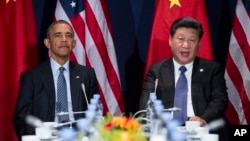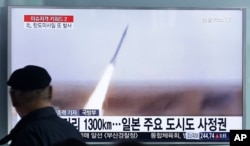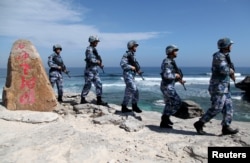The Obama administration will not "paper over" differences with China on maritime and cyber security issues, but will promote "shared interests" in preventing destabilization on the Korean Peninsula and in promoting denuclearization, according to senior U.S. officials.
President Barack Obama will meet with Chinese President Xi Jinping on Thursday on the sidelines of the Nuclear Security Summit.
"Our engagement has also allowed us to address differences in a very candid and constructive way. We don't paper over these differences. We don't hide them," said White House Senior Director for Asian Affairs Dan Kritenbrink.
While North Korea's nuclear threat is expected to be one of the most important issues, the U.S. also will raise concerns about maritime disputes and cyber security during the U.S.-China leaders' meeting, a senior State Department official told VOA.
A United Nations Security Council resolution adopted earlier this month imposes tough new sanctions on Pyongyang. The measure has put China on the spot because 90 percent of North Korean trade flows either to or through China. The U.S. has been encouraging China to exert influence and pressure on North Korea to stop nuclear provocations.
A State Department senior official said that so far the cooperation between Washington and Beijing in ensuring a strong implementation of the resolution has been "very, very good."
"China joins with us in a very strong and intensive focus on ensuring good, solid implementation of the U.N. Security Council resolution, which, as many of you know, places strong constraints on North Korea's ability to continue to conduct commerce across its borders, whether by sea, air or land," said Under Secretary of State Rose Gottemoeller on Wednesday at the Foreign Press Center.
South China Sea
While the U.S. does not claim sovereignty over the South China Sea, Washington has been firm on upholding principles including non-militarization in the hotly contested islands, and a peaceful resolution of disputes consistent with international law.
Beijing has launched a massive effort to assert its claims over a string of islands in the South China Sea through new construction and island-building, ignoring competing claims by Taiwan, Vietnam, the Philippines, Malaysia and Brunei.
More recently, China has deployed a radar system throughout the disputed islands, and an advanced surface-to-air missile system on Woody Island, which is part of the region's Paracel Island chain also claimed by Taiwan and Vietnam.
"We'll be very clear where we believe that there is behavior that is counter to those principles, just as we're very clear in our own interests in promoting international principles like freedom of navigation," said White House Deputy National Security Adviser Ben Rhodes in a briefing to preview the Nuclear Security Summit and Obama-Xi meeting.
U.S. Navy ships have been conducting what officials called "freedom of navigation" operations in international waters, including sailing within 12 nautical miles of disputed islands in the South China Sea, which was denounced by China as a provocation.
Obama's meeting with Xi on Thursday would be their first meeting in 2016 in Washington, D.C., six months after a state visit by Xi last September.






